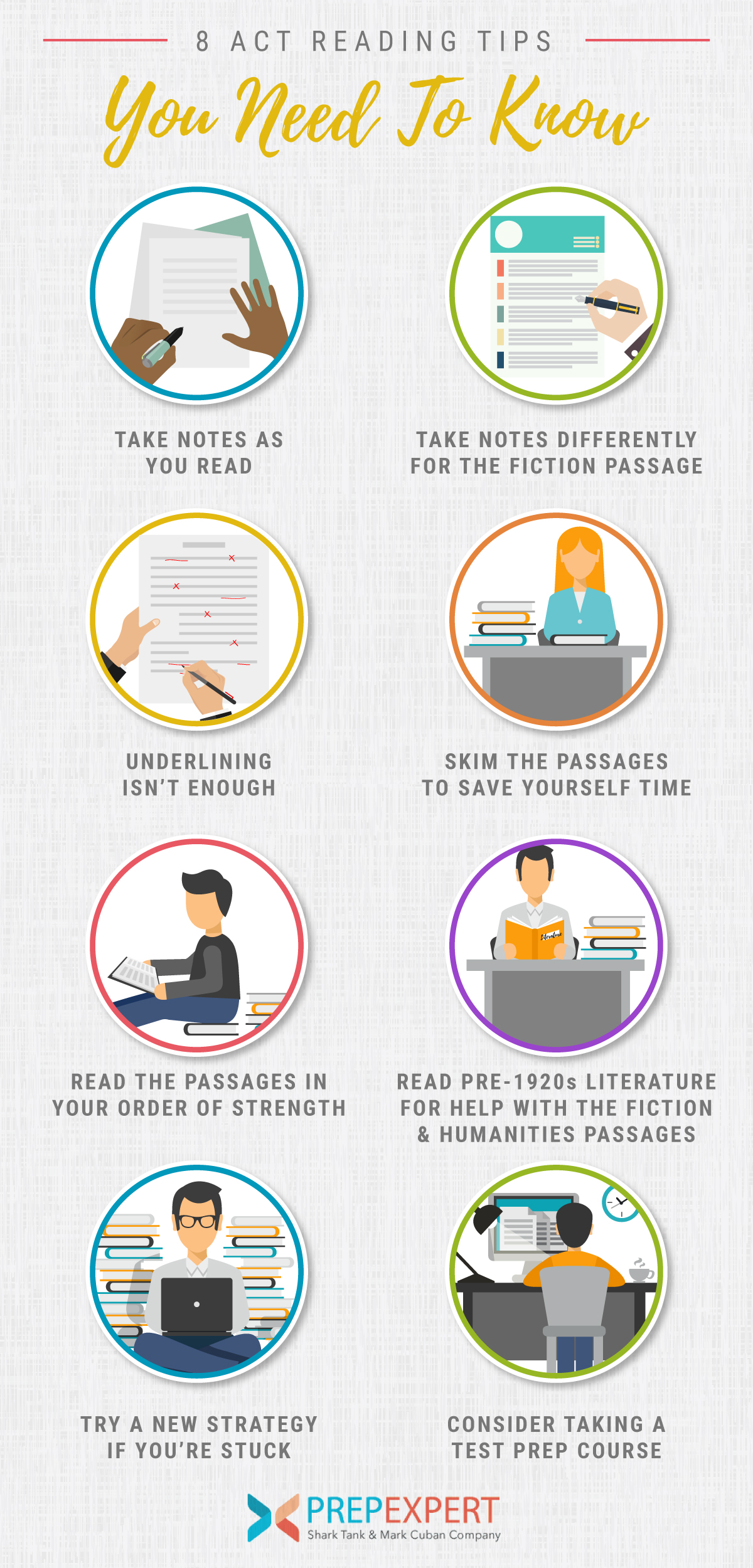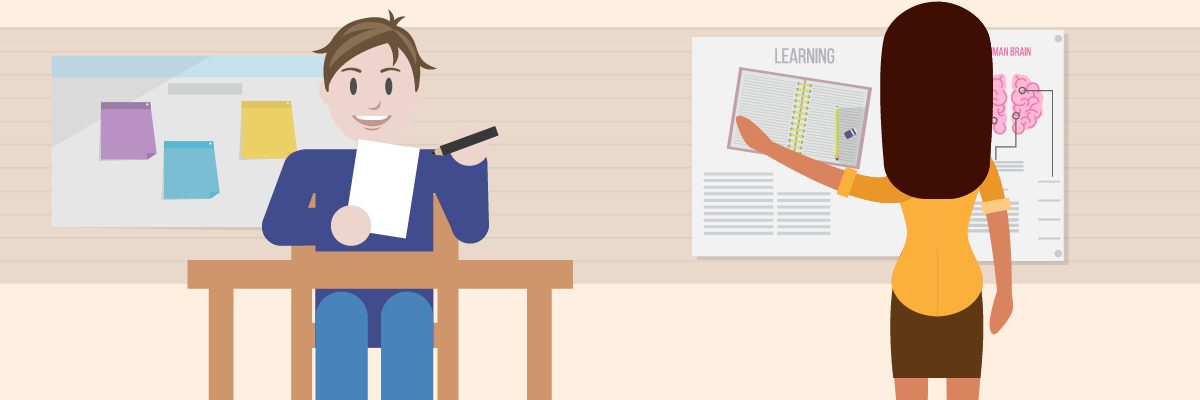7 ACT Reading Tips You Need to Know
Many students dread the ACT Reading test. The Reading test requires you to read four 600-800 word passages, and answer 40 questions, in a breakneck 35 minutes. It’s a challenge—but the good news is, there are strategies to make this part of the exam a lot more doable.
To boost your Reading test score, complete the passages in your order of strength, take notes as you read, and consider skimming passages in order to save time.
More on these tips below. For even more expert advice on the ACT Reading test, consider taking an ACT prep course with Prep Expert.
[act_one]


Take Notes As You Read
Taking notes while you read will keep you focused, improve your understanding of the passages, and save you from re-reading when you’re answering questions.
Yes, note-taking takes time, so why do it? The reason is, effective note-taking actually saves you time on the Reading test, preventing you from having to re-read the passages.
Our short-term memories are not great, and they’re severely taxed during the ACT. It’s inevitable that by the time you reach the questions, you’ll have forgotten what you read, and need to re-reference the passage. This is where your notes will come in handy.
As you read each passage:
- Write down one sentence identifying the main idea of the passage
- Three to four words summing up each body paragraph
Now, you have a ‘table of contents’ you can use to quickly locate the information you need to answer questions. No more endless scanning of the passages after you’ve forgotten important information.
Additionally, note-taking will improve your focus while you read and increase your understanding of the passages. Reading is a passive activity—it’s easy to space out while you’re doing it, and not pick up on anything you’ve read. But, if you take notes, your mind is forced to stay engaged with the text, so you understand and retain more information.

Take Notes Differently For The Fiction Passage
Because fiction doesn’t have a predictable structure, you should take notes on four specific topics—plot, character, setting, and tone.
Your 3-4 words of notes on character should:
- Say who the main character is
- Who the supporting characters are
- How the story is narrated
Your 3-4 words of notes on setting should note the time and place of the story. Your 3-4 words of notes on the plot should describe what happens in the course of the story.
Your 3-4 words of notes on tone should describe the mood of the piece.

Simply Underlining Isn’t Enough
Underlining without note-taking isn’t very useful.
Lots of students underline text as they work their way through passages on the Reading test, but I find that underlining is of limited use if it’s done in the absence of actual notes.
First off, it’s very easy to forget why you underlined something (remember what I said about our short-term memories).
Second, it’s just as easy to underline way too much, to the point where you have underlined almost the entire passage—rendering all of your underlying useless. Furthermore, underlining doesn’t require the level of engagement with the text that note-taking does.
So, you run the risk of losing focus as you read and underlining mindlessly. Note-taking with underlining will help you process information as you read it, resulting in a greater understanding of the text.
[leadmagnet_five]
If you like to underline, then there’s no real reason to stop—just do so in combination with taking notes. Then, at the very least, you’ll remember why you underlined something.

Skim The Passages To Save Yourself Time
If you always run out of time on the Reading test, skim the passages instead.
Here’s how you skim:
- Read the first and last paragraphs of the passage in full
- Read the topic sentence of each body paragraph
- Go and answer the line-cited questions
Finally, when you’re done answering the line-cited questions—and having now read as much of the passage as possible—go and answer the more general questions.
Of course, skimming isn’t ideal—it’s always better to have read the passage in full. But if don’t have the time to do this, skimming is your next-best bet.
[act_two]
Read The Passages In Your Order of Strength
Do the passages you’re best at first and those you’re worst at last.
As you complete more and more practice tests, you’ll start to notice that certain types of passages (Fiction, Social Studies, Natural Science, Humanities) are easier or more interesting to you than others.
Rank the passages in order of your best to worst, then complete them in that order—taking care to bubble in the appropriate places on your Scantron.
The rationale behind this approach is that you’re better off leaving whatever passage you would do worst on for the end when you’re more likely to run out of time and have to guess. It’s better to guess on questions you would have gotten wrong anyway, after all.
Additionally, if certain types of passages interest you more, doing those first will help keep your energy and focus up for the latter passages, which are more likely to be difficult reading.

Read Some Pre-1920s Literature For Help With The Fiction & Humanities Passages
As you study for the ACT Reading test, check out some books written by pre-1920s authors—it will help prepare you for the more verbose and metaphorical style of writing of earlier times.
The most difficult passages for my students on the Reading test tend to be Fiction and Humanities passages that were written prior to 1920. These passages are filled with metaphorical language and imagery and are typically quite dense, making them difficult for students to decipher.
You can better prepare yourself for these types of passages by reading writers from this period—Jane Austen (author of Pride and Prejudice), Henry James (author of The Bostonians), and Virginia Woolf (author of Mrs. Dalloway) are all good options. Get used to the greater description—lots more adjectives—imagery, and metaphorical language.
[leadmagnet_two]
By the time you take the ACT, you’ll be better prepared to find the author’s story or argument in the molasses-like prose these types of passages might present you with.

Try A New Strategy If You’re Stuck
Try out different Reading test strategies until you find the right combination for you.
It’s hard to increase your reading comprehension level over a short period of time. This is why we discuss our reading abilities in terms of grade level—it’s over years, not weeks or months, that we improve.
So, during the weeks, or months, you’re focused on ACT prep, you can’t expect to make big gains on your Reading test score without changing your strategy for the test—whether that means skimming, taking notes, or changing the order you complete the passages in.
The great Transcendentalist author Ralph Waldo Emerson famously wrote, “A foolish consistency is the hobgoblin of little minds.” If you find your approach to the Reading test isn’t helping your score, don’t keep doing things the same way! Mix and match the different strategies outlined above until you find the right combo for you.
Perhaps you’ll benefit enormously from note-taking; or, maybe you won’t find it particularly useful. Maybe skimming will open up the test for you; or, perhaps you’re just the type of person who needs to read things in full. You’ll never know unless you take lots of practice tests and find out.

Consider Taking A Test Prep Course
An ACT prep course with Prep Expert can help boost your score dramatically.
Although it’s difficult to dramatically improve your score on the Reading test, it’s far from impossible. Lots of focused studying and practice tests can make a big difference. And if you’re having difficulty improving your score on your own, you can always sign up for an ACT prep course with Prep Expert.
Prep Expert’s ACT prep course will teach you new ways to look at and answer ACT Reading questions, how to glean information from the passages as you read them, and how to improve your speed as you work your way through the passages.
So, if you’ve worked hard and your score just won’t improve, be proactive and get in touch with Prep Expert. Our expert instructors—all of who have scored a 36 on the ACT—teach classes throughout the year, in cities across the country. They’re also available for one-on-one tutoring if you’d prefer some individualized attention.
Prep Expert also offers online ACT prep courses and tutoring. A big benefit to the online course is the ability to watch recorded classes, should you miss a class or need to rewatch part of a lesson. Class videos remain available for 90 days after the course ends, so you can watch as many times as you like as you continue ACT prep on your own.
[act_three]
For more test strategy, college admissions, and scholarship application tips sign up for our FREE class happening right now!
ACT Reading Tips FAQ
Should I take notes while working on reading questions?
Yes. Taking notes while you read will keep you focused, improve your understanding of the passages, and save you from re-reading when you’re answering questions.
How should I take notes?
Because fiction doesn’t have a predictable structure, you should take notes on four specific topics—plot, character, setting, and tone.
How should I skim the reading sections?
Here’s how you skim: read the first and last paragraphs of the passage in full, so you can get a sense of its main idea; then, read the topic sentence of each body paragraph, so you know what they’re about; after that, go and answer the line-cited questions, which will require you to dip back into the passage and read the lines they reference.
How should I read the passages themselves?
Read the passages in your order of strength. Do the passages you’re best at first and those you’re worst at last.
Written by Todd Marcus
More from Todd Marcus

ACT Reading Passage Types | What To Expect
Be ready for the ACT Reading section by knowing the kinds of things you'll be reading. Here are the ACT…

Taking The ACT Junior Year
If you're ambitious and want to give yourself plenty of time for score improvement, then consider taking the ACT junior…

ACT 2020 Score Release Dates
Here then are the ACT 2020 score release dates to plan around, as well as, the different kinds of available…